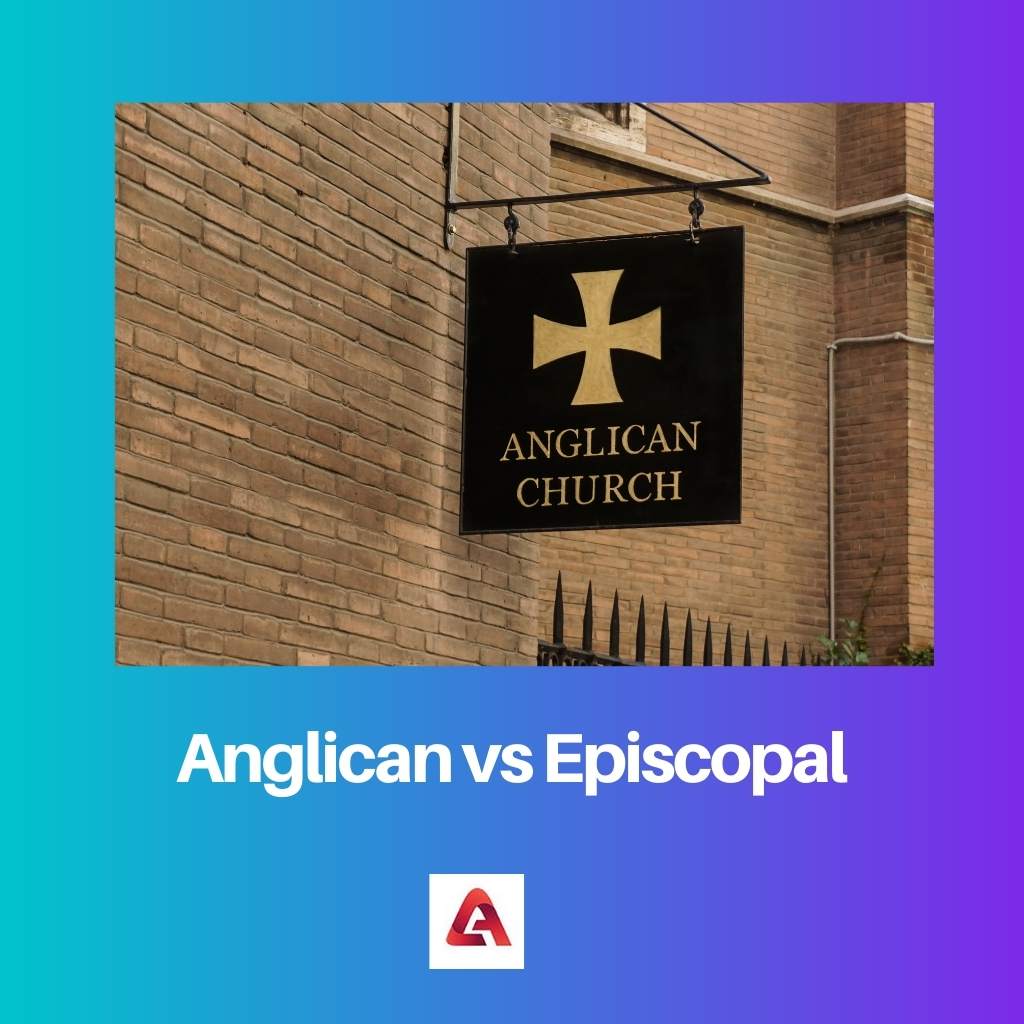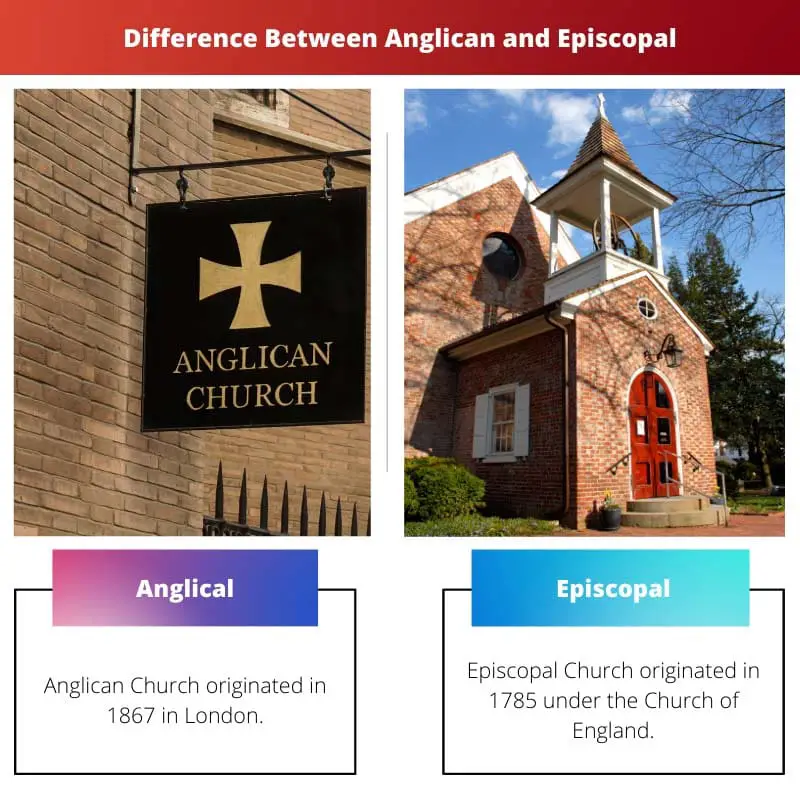Anglicanism and Episcopalism both stem from the Church of England, sharing similar liturgical practices and beliefs. The key distinction lies in nomenclature and global governance: “Anglican” generally refers to the broader communion of churches worldwide, while “Episcopal” specifically denotes the American branch of Anglicanism governed by bishops.
Key Takeaways
- Anglican and Episcopal are both part of the larger Christian denomination of Protestantism.
- Anglican refers to the Church of England and its global affiliates, while Episcopal refers to the American branch of the Anglican Communion.
- The main difference between the two is their governance structure, with the Anglican Church having a more decentralized structure and the Episcopal Church has a more centralized hierarchy.
Anglican vs Episcopal
Anglican refers to the broader religious tradition and community that emerged from the Church of England during the Reformation in the 16th century, emphasizing the importance of the Bible and tradition. Episcopal refers specifically to the American branch of the Anglican Communion.

Anglican Communion was founded in 1867 in London by Charles Longley, who was the Archbishop of Canterbury. The Church of Anglican Community believes in one holy, catholic and apostolic church.
Episcopal Church is the American counterpart of the Anglican Church. It also traces its origins to the Church of England in the colonies of America.
Comparison Table
| Feature | Anglican | Episcopal |
|---|---|---|
| Term | Refers to the global Christian denomination | Refers to specific member churches within the Anglican Communion |
| Origin | Church of England during the 16th century Reformation | Established in former British colonies after gaining independence |
| Location | Primarily in countries with historical ties to England | Primarily in the United States, but also present in other former colonies |
| Name Usage | Often used in countries with strong British ties (e.g., Canada, Australia) | Often used in countries without strong British ties (e.g., USA, Philippines) |
| Doctrine & Practices | Broad spectrum of beliefs, ranging from high church (similar to Catholicism) to low church (more evangelical) | Generally similar to Anglican beliefs and practices |
| Leadership | Hierarchical structure with Archbishops and Bishops | Hierarchical structure with Bishops |
| Unity | Part of the larger Anglican Communion with an Archbishop of Canterbury as a symbolic head | Independent churches within the Anglican Communion |
What is Anglican?
Anglicanism refers to the tradition, beliefs, and practices associated with the Anglican Communion, a global association of churches that trace their roots to the Church of England. The term “Anglican” is derived from the Latin word “anglicanus,” meaning English. This Christian tradition has a distinctive history, theology, and ecclesiology that set it apart from other denominations within Christianity.
Historical Development
Early Origins
Anglicanism’s roots can be traced back to the 16th-century English Reformation when King Henry VIII sought to break away from the Roman Catholic Church. The creation of the Church of England in 1534 marked the beginning of a distinctively English Christian tradition.
Elizabethan Settlement
The reign of Queen Elizabeth I (1558-1603) solidified Anglicanism’s identity through the Elizabethan Settlement. This compromise sought to balance Protestant and Catholic elements, shaping the distinctive character of Anglican worship and theology.
Theological Foundations
Scripture, Tradition, and Reason
Anglicanism is known for its threefold approach to authority: Scripture, Tradition, and Reason. While upholding the authority of the Bible, Anglicans also recognize the importance of tradition and reason in interpreting and understanding the Christian faith.
The Book of Common Prayer
A central element of Anglican worship is the Book of Common Prayer. First compiled by Thomas Cranmer in the 16th century, it provides liturgical texts and prayers used in Anglican worship services. The Book of Common Prayer reflects the distinctive Anglican blend of theological richness and worship simplicity.
Ecclesiology and Church Structure
Episcopal Polity
Anglicanism follows an episcopal polity, meaning it is structured around bishops who have a role in overseeing the local churches. This hierarchical structure emphasizes apostolic succession, linking contemporary bishops to the earliest Christian leaders.
Lambeth Quadrilateral
The Lambeth Quadrilateral, proposed in 1888, outlines four foundational principles for Anglicans: the authority of Scripture, the Nicene Creed, the sacraments of Baptism and Holy Communion, and the historic episcopate. This document serves as a basis for unity within the Anglican Communion.
Worship and Sacraments
Liturgical Worship
Anglican worship is characterized by its liturgical nature, with a structured order of service. The liturgy incorporates the sacraments, hymns, and readings from the Bible, providing a common framework for worship across Anglican churches.
Sacraments
Anglicanism recognizes two central sacraments: Baptism and Holy Communion. These sacraments hold a central place in Anglican theology and practice, emphasizing the importance of God’s grace in the life of the believer.
Diversity within Anglicanism
Broad Theological Spectrum
Anglicanism encompasses a wide range of theological perspectives, from high church Anglo-Catholicism to low church Evangelicalism. This diversity is reflected in worship styles, theological emphases, and ecclesiastical practices.
Global Communion
The Anglican Communion is a global network of autonomous churches, each with its own cultural expressions and contextualized ministries. This diversity is a strength and challenge, requiring ongoing dialogue and discernment within the communion.
Contemporary Challenges and Debates
Issues of Human Sexuality
Anglicanism has grappled with debates over human sexuality, particularly regarding the ordination of LGBTQ+ individuals and the blessing of same-sex unions. These discussions have led to tensions within the communion, with some provinces adopting more inclusive stances while others maintain traditional teachings.
Women in Ministry
The role of women in ministry has been a significant point of discussion within Anglicanism. While many provinces have embraced the ordination of women as priests and bishops, others continue to uphold more traditional views on gender roles.

What is Episcopal?
Episcopal refers to a form of church governance and a tradition within Christianity. The term is commonly associated with the Episcopal Church, a Christian denomination that follows the Episcopal tradition.
Historical Background
Early Development
The Episcopal tradition traces its roots to the early Christian church and the historical development of episcopal polity, a hierarchical system of church governance.
Anglican Influence
The Episcopal Church has strong ties to the Anglican Communion, with historical connections to the Church of England. The Episcopal Church in the United States, for example, emerged as an independent entity following the American Revolution.
Governance Structure
Episcopal Polity
Episcopal polity is characterized by the hierarchical structure of the church, where bishops hold a significant role in leadership and decision-making. Bishops are consecrated and oversee geographic regions known as dioceses.
General Convention
The Episcopal Church is governed by a General Convention, a bicameral legislative body consisting of the House of Bishops and the House of Deputies. This convention sets policies, elects leaders, and addresses theological and social issues.
Worship and Liturgy
Book of Common Prayer
The Book of Common Prayer is a central element in Episcopal worship. It contains liturgical texts, prayers, and rituals that guide the worship practices of the Episcopal Church. It reflects a balance between tradition and adaptation.
Sacraments
Episcopalians recognize seven sacraments, including baptism and Eucharist. The liturgical celebrations of these sacraments play a crucial role in the spiritual life of Episcopal congregations.
Inclusivity and Diversity
Openness to Diversity
The Episcopal Church is known for its inclusivity and openness to diverse theological perspectives. It embraces a broad range of beliefs and practices, fostering dialogue and unity amid diversity.
Ordination of Women and LGBTQ+ Inclusion
Episcopalians have been at the forefront of debates on social justice within Christianity. The ordination of women and the inclusion of LGBTQ+ individuals in the clergy reflect the Episcopal Church’s commitment to equality.
Social Justice and Advocacy
Engagement in Social Issues
Episcopalians are actively involved in addressing social justice issues. The church has taken stances on topics such as civil rights, immigration, and environmental stewardship, aligning its teachings with a commitment to justice and compassion.
Ecumenical Relations
The Episcopal Church engages in ecumenical relations with other Christian denominations and seeks to build bridges across religious traditions to promote understanding and cooperation.

Main Differences Between Anglicans and Episcopal
- Terminology:
- Anglicans: The term “Anglican” is more commonly used internationally to refer to members of the Anglican Communion.
- Episcopalians: The term “Episcopalian” is primarily used in the United States to describe members of the Episcopal Church.
- Global Structure:
- Anglicans: Belong to the broader Anglican Communion, a global association of churches with historical ties to the Church of England.
- Episcopalians: Primarily associated with the Episcopal Church in the United States, which is one member of the larger Anglican Communion.
- Church Governance:
- Anglicans: Governance structures can vary, but generally involve a balance between bishops, clergy, and laity in decision-making.
- Episcopalians: Episcopal polity, meaning governance by bishops; bishops play a significant role in decision-making.
- Theological Emphasis:
- Anglicans: Tend to be more diverse in theological perspectives, ranging from conservative to liberal, with a broad theological umbrella.
- Episcopalians: Similarly diverse theologically, but within the context of the Episcopal Church in the U.S., there may be a tendency toward a more liberal or progressive stance on certain issues.
- Liturgical Practices:
- Anglicans: Follow the Book of Common Prayer or similar liturgical resources, with variations across different provinces and regions.
- Episcopalians: Also use the Book of Common Prayer, with adaptations made by the Episcopal Church in the U.S.
- Women in Clergy:
- Anglicans: Ordination of women as priests and bishops varies among provinces, with some allowing it and others not.
- Episcopalians: Generally supportive of the ordination of women, and the Episcopal Church in the U.S. has allowed the ordination of women for several decades.
- Attitude Toward LGBTQ+ Inclusion:
- Anglicans: Diverse views across provinces, ranging from more conservative to more inclusive stances on LGBTQ+ issues.
- Episcopalians: Generally more inclusive and affirming of LGBTQ+ individuals, including the ordination of openly gay and lesbian clergy and the blessing of same-sex unions.
- Cultural and Regional Variations:
- Anglicans: The term encompasses a broader range of churches globally, each with its cultural and regional characteristics.
- Episcopalians: Primarily associated with the United States, reflecting American cultural and social contexts.

- https://books.google.com/books?hl=en&lr=&id=9Fyce9FgrPgC&oi=fnd&pg=PP2&dq=Anglicans+and+Episcopal&ots=2Hth4mjijL&sig=zOZjP8jfxuEdNsZyDMHsBwoUO5E
- https://books.google.com/books?hl=en&lr=&id=_iK5VggudLkC&oi=fnd&pg=PR7&dq=Anglicans+and+Episcopal&ots=M8U3lPHZ8X&sig=ttkZa6yrci0eZ6ac6RPfdRsu6Wo

The detailed comparison of the historical origins and distinctive characteristics of Anglican and Episcopal is an invaluable resource for understanding the complexities of these denominations.
The nuanced exploration of Anglicanism and Episcopalianism enriches our knowledge of the diversity within Christian traditions.
The comprehensive comparison of the Anglican and Episcopal traditions deepens our understanding of the unique contributions of each denomination to Christianity.
I appreciate the detailed comparison of the organizational structure and origins of Anglican and Episcopal. This information is very enlightening.
The rich historical context of these denominations contributes to a deeper understanding of their place in Christianity.
The detailed analysis of the historical origins, territorial differences, and membership statistics of Anglican and Episcopal enhances our understanding of these prominent Christian denominations.
The article effectively captures the nuanced differences and shared historical roots of Anglican and Episcopal, contributing to a more comprehensive understanding of these denominations.
The comprehensive examination of Anglican and Episcopal characteristics provides valuable insights into the diversity and richness of Christian traditions.
The comprehensive comparison of Anglican and Episcopal traditions offers a compelling narrative that illuminates the historical, theological, and institutional aspects that shape these influential Christian denominations.
The rich historical context and global reach of Anglican and Episcopal traditions provide an enriching perspective on the diversity and complexity of Christian religious expressions.
The historical and organizational analysis of Anglican and Episcopal traditions adds depth to our understanding of the broader landscape of Christian denominations.
The historical evolution of the Anglican and Episcopal traditions is presented in a clear and detailed manner, offering a valuable resource for those interested in these religious denominations.
The historical background and global influence of these denominations contribute significantly to their distinct identities within Christianity.
The comparison of the headship and parishes between Anglican and Episcopal provides a comprehensive understanding of their organizational structures.
This article offers a thorough exploration of the features and distinctions between Anglican and Episcopal, shedding light on their historical, theological, and organizational aspects.
Understanding these religious traditions in their historical and theological contexts is essential for a comprehensive appreciation of their differences.
The emphasis on the historical and geographical aspects of these denominations enhances our understanding of their unique characteristics.
The distinction between Anglicanism and Episcopalianism is well-explained in this article. The governance structures and origins play a pivotal role in defining these denominations.
The detailed comparison of their territories and membership provides valuable insight into the global influence of these denominations.
Indeed, the historical and contextual aspects are crucial in comprehending the development of religious movements.
The article presents an insightful comparison of Anglicanism and Episcopalianism, highlighting the historical, geographical, and structural features that distinguish these influential Christian traditions.
The detailed exploration of Anglican and Episcopal traditions deepens our understanding of the diverse expressions of Christianity across different historical and geographical contexts.
This article provides an excellent comparison between Anglican and Episcopal. The historical and social context behind both is very informative and interesting.
Yes, it’s important to understand the roots of religious denominations in order to appreciate their differences and similarities.
The comprehensive analysis of Anglican and Episcopal history and structure adds significant depth to the understanding of these Christian denominations.
It’s fascinating to see how the historical origins of these denominations have shaped their distinct characteristics over time.
The intricate details of leadership and parishes provide a nuanced perspective on the differences between Anglican and Episcopal churches.